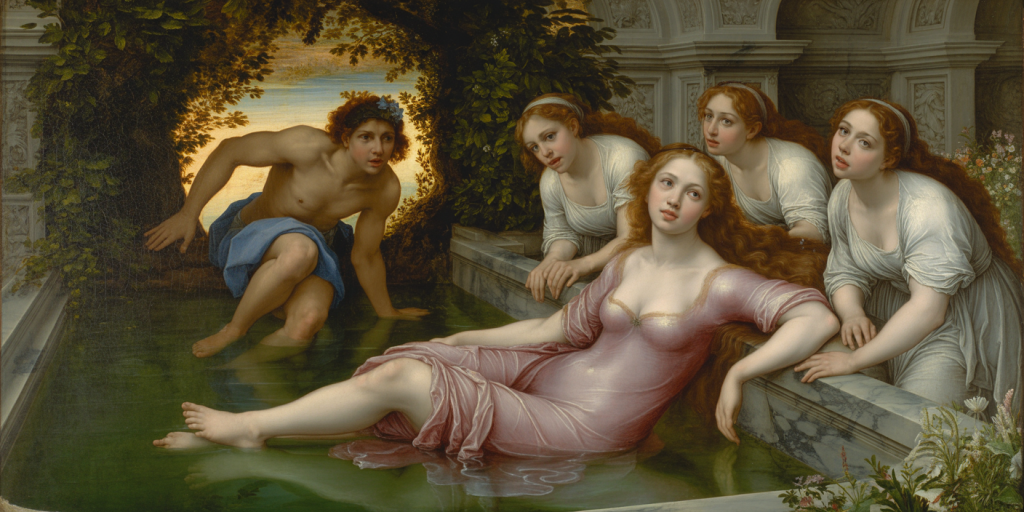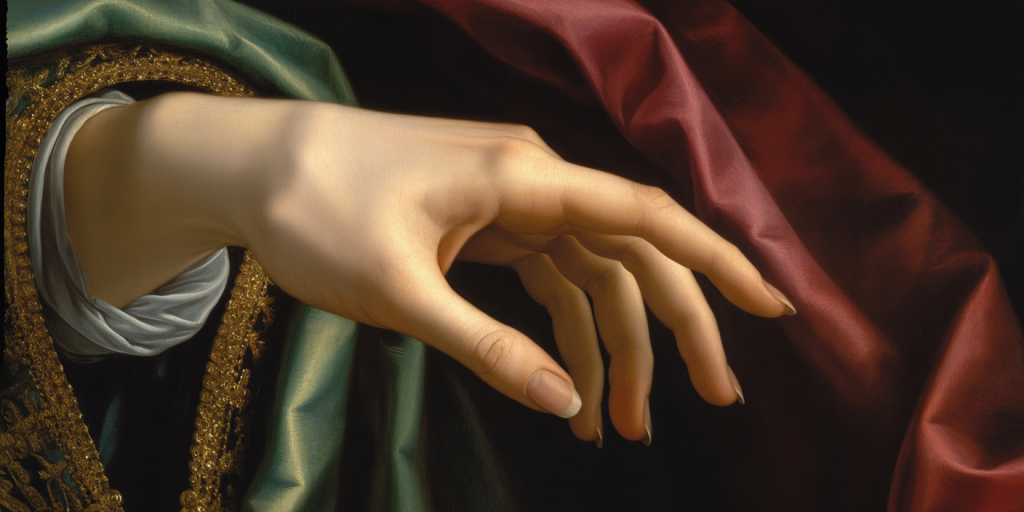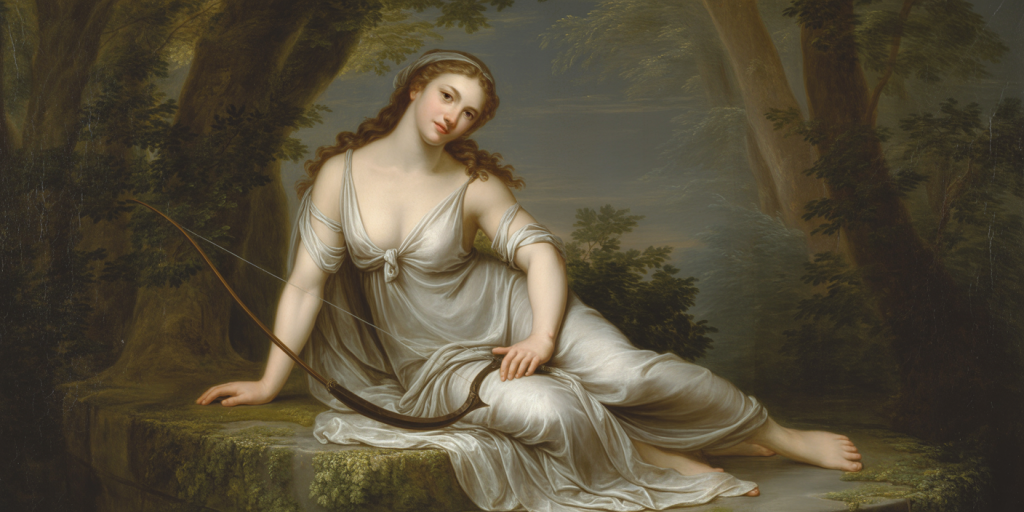Artemis’ Bath beneath Boucher’s Dreamlike Veil
By François Boucher
Where the Body Meets Mist and Myth
There are paintings that gently awaken the senses like soft rain on a silk canopy. In Boucher’s Diana after the Hunt, the myth is not shouted, but whispered in pastel sighs and powdered glances. The divine is not distant—it reclines. Time is suspended not by decree, but by drowsy sunlight and opalescent water. Artemis—here named Diana—no longer bears the sternness of the huntress; she bathes within a veil of dreams, wrapped in a world that glows rather than judges.
Boucher does not summon thunder. He invites reverie. The body, myth, and natural world blend like honey in warm milk. His brush caresses rather than commands. And beneath the shimmer of satin skin and luminous sky, something delicate stirs: a divine figure softened not by shame or wrath, but by languor, perfume, and sensual dusk.
Table of Contents
- The Dreaming Goddess Reimagined
- Velvet Pastels and Whispered Flesh
- Drapery Like Morning Mist
- The Pool Where Time Forgets
- Diana’s Gaze through the Curtain of Sleep
- Pearls of Light on Goddess Skin
- The Erotic as Atmosphere, Not Statement
- The Feminine Divine Without Fear
- Languor Framed by Laurel and Linen
- When the Body Breathes with the Sky
- Carnal Clouds and Sacred Light
- From Bow to Bare Shoulder
- Diana in the Absence of Vengeance
- The Composition’s Sigh and Flow
- Blushes that Replace Thunder
- Myth Unwound into Garden Silence
- The Floral Script of Desire
- When Nudity is Neither Shame nor Invitation
- The Divine Reduced to Reverie
- François Boucher’s Theological Tenderness
The Dreaming Goddess Reimagined
In Boucher’s depiction of Diana, the traditional sharpness of the goddess is gone. She does not hunt—she exhales. The fierce Artemis of Greek lore rests here in a Rococo daydream, where arrows are forgotten, and wrath melts into bathwater.
This is not betrayal—it is transformation. Boucher softens myth, not to dilute it, but to offer another truth: that even the divine may long for softness, for fragrance, for peace.
Velvet Pastels and Whispered Flesh
The palette is a lullaby. Creams, blushes, lavenders—each hue evanescent as a sigh. Boucher does not define flesh; he caresses it into being. Diana’s skin is not rendered—it is remembered.
There is nothing assertive in the pigment. Each color suggests rather than states. Flesh and flower share tonalities. Her body becomes both marble and breath—ideal and transient.
Drapery Like Morning Mist
The folds of linen that gather near her thighs, or fall from an arm, feel less like garments and more like condensed fog. Drapery here is not to hide—it is to heighten. The soft barrier between sacred skin and earthly eye is transparent by design.
Boucher paints cloth as if painting thought. Each fold curves like a sentence not finished, a secret not confessed. These are veils of morning, not modesty.
The Pool Where Time Forgets
The bath, though still, contains the pulse of eternity. Its surface holds no tension—only reflection. This is not water to cleanse, but to dissolve. In it, time sighs and forgets its linearity.
The water is a mirror of slowness. The goddess touches it with fingers made of stillness. One imagines even the ripples here prefer not to move.
Diana’s Gaze through the Curtain of Sleep
Her eyes are not open with alertness—they are half-lidded, veiled in inwardness. This is not the stare of the huntress. It is the look of someone who has briefly let the world go.
Her gaze glances past us, not out of contempt, but detachment. She is more dream than deity, and in that distance, she becomes more tender than myth has ever allowed her to be.

Pearls of Light on Goddess Skin
Light in this painting does not strike—it settles. On Diana’s shoulder, a whisper of gold. Along her thigh, a dewdrop gleam. Boucher renders illumination like a gentle hand grazing satin.
The highlights are not declarations—they are sighs. A shimmer on her calf, a glow in her cheek, each more like memory than fact. This light is not daylight—it is the soul of morning.
The Erotic as Atmosphere, Not Statement
There is eroticism here, yes—but not of body asserting itself. Rather, it is the atmosphere that seduces. The languid pose, the softness of color, the plushness of everything—even the sky.
Boucher creates a realm where sensuality floats like pollen. The erotic is not in exposure—it is in suggestion. Not in form—but in feeling.
The Feminine Divine Without Fear
Diana here is not afraid. She does not guard her nudity, nor does she flaunt it. She simply is. In Boucher’s hands, femininity is not defense, but presence. It occupies space like flowers occupy fields.
Her body exists without tension. No shame, no vengeance, no performance. Only the profound quiet of being observed by the sky and accepting its gaze.
Languor Framed by Laurel and Linen
The natural elements serve not as backdrop, but as lullaby. Laurel branches curl near her feet. Folds of fabric cradle her ribs. These objects do not frame her—they lull her.
Everything bends to her pose. The world becomes a cradle. Boucher constructs not a scene, but a reverent hush made of nature and cloth.
When the Body Breathes with the Sky
There is unity between skin and air. Her flesh seems to inhale the very light around her. The contours of her torso echo the soft folds of clouds. Her repose becomes an extension of the landscape.
Boucher paints not a figure in nature—but a figure of nature. The goddess dissolves into her surroundings until body and breeze become one thought.
Carnal Clouds and Sacred Light
The sky is not a void—it is a velvet ceiling, a soft dome of unseen hands. Even the clouds carry carnal implication, swelled and pinked like the inside of a wrist.
The sacred in Boucher is not cold—it is blushing. The heavens pulse with the same warmth that kisses Diana’s cheeks. In this world, holiness hums with heat.
From Bow to Bare Shoulder
Though her bow rests nearby, it is no longer menacing. It is an echo of identity, not a threat. Diana’s shoulder, once strong and taut with warlike tension, now melts into repose.
This shift is more than physical—it is mythological. Power reclines. The hunt is over. And in its place, a softness no less divine.

Diana in the Absence of Vengeance
There is no Actaeon here. No judgment. No consequence. This is Diana before or beyond the myth. She is not about to punish—she is about to dream.
Boucher offers us a rare moment where a deity is not defined by act, but by pause. By not doing. By simply being. And in that stillness, she becomes more sacred than ever.
The Composition’s Sigh and Flow
Everything in this painting curves. There are no rigid lines, no hard edges. From the bend of Diana’s knee to the arc of her arm, the entire canvas breathes in crescendos of softness.
The eye travels as if on silk. There is no resistance. Composition becomes lullaby. Balance is not measured—it is felt.
Blushes that Replace Thunder
In myth, Diana’s fury is quick and final. But in Boucher’s world, her anger dissolves into warmth. Her cheeks hold no rage, only rose. Her expression offers no verdict, only velvet.
The thunder has left the sky. In its place, a petal. In her mouth, no command. Only breath. This is myth after its storm.
Myth Unwound into Garden Silence
Boucher unwinds mythology into a quiet afternoon. The forest does not echo with drama—it dozes. The gods do not intervene—they nap. And in this world, Diana sheds not just clothes—but archetypes.
The myth is not erased. It is transformed. Into a perfume. Into silk. Into the hush between sunlight and sleep.
The Floral Script of Desire
Scattered flowers near her limbs are more than decor—they are the script of desire. Petals echo her curves. Their open faces mimic her breath. They grow where emotion might otherwise be spoken.
These blooms do not decorate—they interpret. Desire, in Boucher’s world, does not shout. It blossoms.

When Nudity is Neither Shame nor Invitation
Boucher’s Diana does not hide, but she does not beckon. Her nudity is a state of peace, not power. She lies in a world where the body is not moralized—it simply exists.
This is the radical gentleness of Boucher’s vision. To allow a goddess to be nude without being consumed. To paint a body without demanding it perform.
The Divine Reduced to Reverie
What is divinity if not the ability to rest? Boucher answers myth with tenderness. His Diana is still a goddess—but a dreaming one. And in her slumber, she holds more truth than in war.
She teaches us that the divine does not only strike. It sighs. It blushes. It closes its eyes. And in doing so, it teaches us how to love the body again—not as conquest, but as quiet.
François Boucher’s Theological Tenderness
Rococo is often dismissed as frivolous, but in Boucher’s hands, it becomes theology. A theology of softness. Of reverence through intimacy. Of divine truths whispered in the rustle of linen and leaves.
His Diana is not a lesser goddess. She is a fuller one. Complete in her rest. Complete in her dream. And through her, Boucher invites us not to fear beauty—but to forgive it.
FAQ – Understanding Boucher’s Dreamlike Diana
Who was François Boucher?
François Boucher (1703–1770) was a French Rococo painter known for his playful, sensuous scenes and mythological fantasies. A favorite of Madame de Pompadour, he became a leading figure of 18th-century art in France.
What is “Diana after the Hunt”?
A painting by Boucher that depicts the goddess Diana (Artemis) reclining nude after bathing, surrounded by nymphs and pastoral elements. It transforms the classical myth into a Rococo dreamscape.
Is this version of Diana faithful to myth?
Not strictly. Boucher softens her image, removing the harshness of her huntress aspect to emphasize her beauty, serenity, and sensuality.
What characterizes Boucher’s style?
Delicate color palettes, lush textures, idyllic compositions, and a dreamlike, often erotic, atmosphere. His work emphasizes grace, softness, and intimate beauty.
How does Boucher differ from other depictions of Diana?
Where others show her punishing or resisting, Boucher lets her rest. He shows her body not as an object of power or shame, but as serenity itself.
Final Reflections – Where Beauty Falls Asleep
In Boucher’s world, beauty does not demand—it reclines. Diana no longer shatters men into stags. She turns her gaze inward and rests her wrath beneath a laurel’s shadow. Her myth is not erased—it is cradled.
And so, under Boucher’s dreamlike veil, we meet not the goddess of fear, but of forgiveness. Of stillness. Of petaled breath and celestial calm. We meet the divine in its softest skin—and learn to dream with her.
